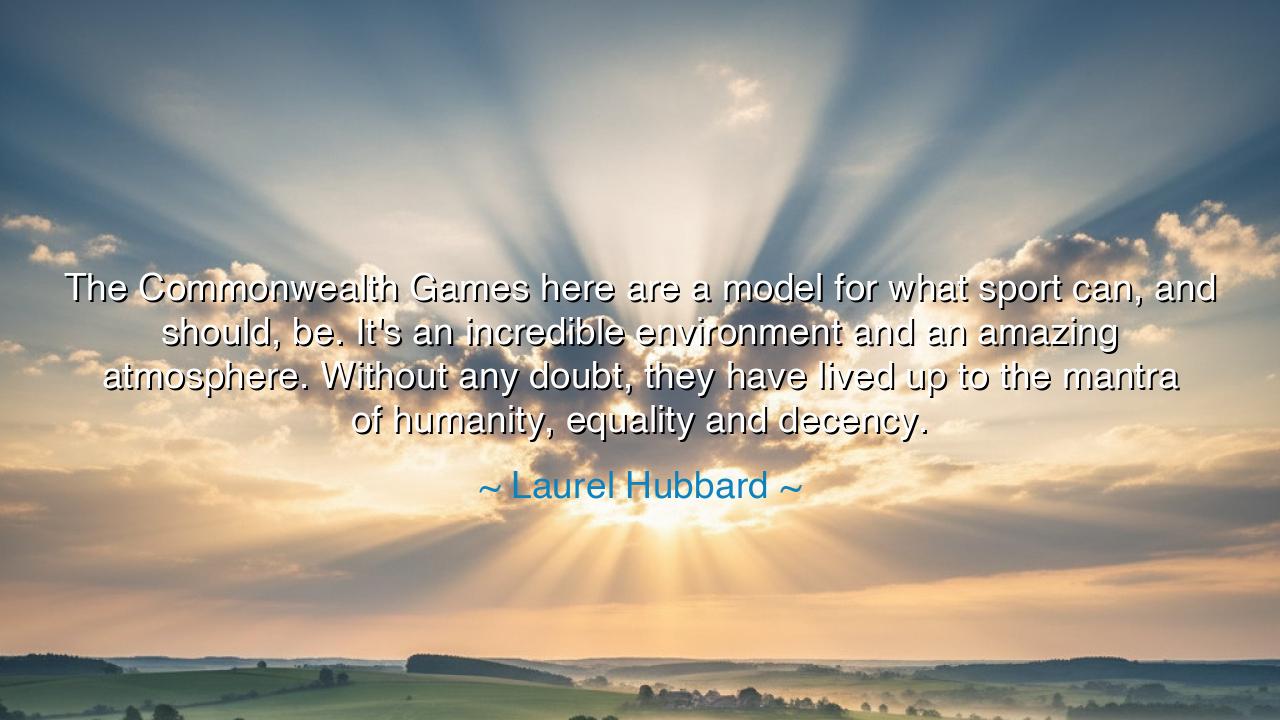
The Commonwealth Games here are a model for what sport can, and
The Commonwealth Games here are a model for what sport can, and should, be. It's an incredible environment and an amazing atmosphere. Without any doubt, they have lived up to the mantra of humanity, equality and decency.






In the noble and stirring words of Laurel Hubbard, we hear a call that transcends the boundaries of sport: “The Commonwealth Games here are a model for what sport can, and should, be. It's an incredible environment and an amazing atmosphere. Without any doubt, they have lived up to the mantra of humanity, equality and decency.” These words are not merely an observation of an athletic event; they are a hymn to the higher ideals of the human spirit. In them resounds the belief that sport, when purified of prejudice and rivalry’s bitterness, becomes a mirror of what civilization itself strives to be—a realm of fairness, unity, and respect among all people.
The origin of this quote comes from the experience of Laurel Hubbard, a New Zealand weightlifter who became a symbol of courage and inclusion. Her presence at the Commonwealth Games, as one of the first openly transgender athletes to compete at such a level, stirred both admiration and controversy. Yet her words reflect neither self-defense nor pride, but gratitude—for she saw in those Games a glimpse of a future where the world competes not to conquer, but to connect. Her praise of the Games as a “model” reveals her conviction that sport, when rooted in humanity, can be a sacred space of reconciliation—a place where the walls that divide are replaced by the bridges of shared endeavor.
In the ancient world, the Greeks too believed in the sanctity of athletic gatherings. The Olympic Games, held in honor of Zeus, were more than contests of strength—they were celebrations of peace. For their duration, all wars were halted; enemies laid down their arms, and nations met not on the battlefield, but in the arena. Laurel Hubbard’s words revive that same ancient spirit. She speaks of an environment where the athlete’s worth is not measured by victory alone, but by their embodiment of decency, their respect for others, and their ability to honor the divine in human effort. The mantra of humanity, equality, and decency is not a slogan—it is the soul of every true competition, the principle that transforms contest into communion.
Consider the story of Jesse Owens, who at the 1936 Berlin Olympics defied both gravity and hatred. In a time when tyranny sought to proclaim one race superior to all others, Owens—a Black American—rose to glory through sheer grace and strength. But what made that moment eternal was not his gold medals alone, but his friendship with Luz Long, a German athlete who, despite living under a regime of intolerance, offered him advice and respect. In their handshake, seen by millions, was the very spirit of what Hubbard calls “humanity, equality, and decency.” Against the backdrop of hatred, two men proved that the truest victory lies not in domination, but in recognition of shared humanity.
Hubbard’s declaration is thus both celebration and challenge. She celebrates the Commonwealth Games for showing what is possible when people of all nations, races, and identities come together under one banner of respect. But she also challenges the world to make this spirit permanent—to carry it beyond the stadium and into society. For sport, though fleeting in its moments of triumph, reflects the larger struggles of humankind: how to honor difference without division, how to compete fiercely yet love generously, how to hold fast to decency in the heat of ambition.
To the wise, these words reveal an eternal pattern. Whether in the agora of Athens or the fields of modern competition, humanity has always sought meaning in its contests. The greatest champions are not those who stand tallest on the podium, but those who remind us that strength and compassion can dwell in the same heart. When Hubbard praises the Games for their inclusiveness, she speaks for every soul that has ever fought for the right simply to be seen—as equal, as human, as worthy. Her vision is a vision of harmony, where equality is not an argument but a lived reality, and decency is not demanded, but offered freely.
The lesson, then, is clear: true greatness is measured not by power, but by principle. Whether one competes on the track, in the workplace, or in the theater of daily life, the path of honor is the same—to uphold humanity, to practice equality, and to act with decency. Let us, therefore, follow Hubbard’s insight and make of every arena a temple of fairness. Let us cheer not only for the swift and strong, but for the brave and kind. For when the heart of competition beats in rhythm with compassion, the world itself is uplifted.
So let these words of Laurel Hubbard be remembered as more than a reflection on sport—they are a vision for civilization. The Commonwealth Games, in her eyes, are not just games; they are a prophecy of what the human family can become. When we choose respect over rivalry, unity over exclusion, and kindness over cruelty, we live up to the divine calling written in our nature. For the true victory of humanity will not be won in the medals we earn, but in the hearts we open—and in the dignity we extend to every soul who dares to stand among us as equal.






AAdministratorAdministrator
Welcome, honored guests. Please leave a comment, we will respond soon